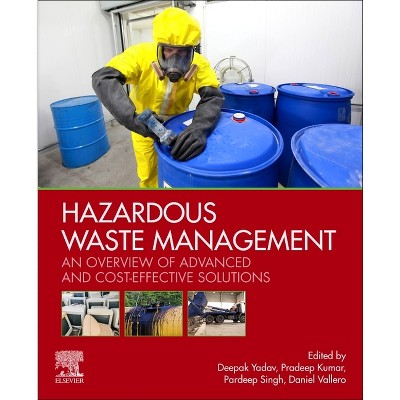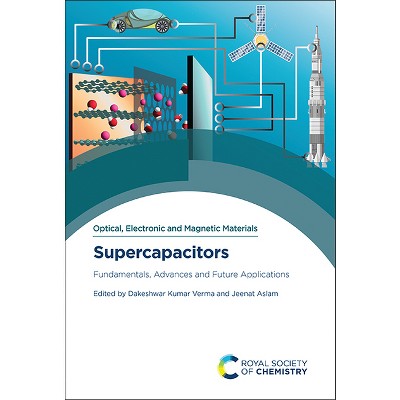About this item
Highlights
- ELECTRONIC WASTE MANAGEMENT Current knowledge on electronic waste management strategies, along with future challenges and solutions, supported by case studies Electronic Waste Management maps out numerous aspects of health and environmental impacts associated with electronic waste, thoroughly detailing what we can expect in terms of the use of electronic products and the management of electronic waste in the future.
- About the Author: Sunil Kumar is a Senior Principal Scientist at CSIR-National Environmental Engineering Research Institute, Nagpur, India.
- 368 Pages
- Science, Chemistry
Description
About the Book
"Electronic waste (E-waste) is a growing problem around the world. Every year, millions of tons of electronic devices are discarded, and much of this waste ends up in landfills. This can have a number of negative impacts, including environmental pollution, health risks, and economic losses. The environmental impacts and health risks of E-waste are significant. When e-waste is dumped in landfills, it can leach harmful chemicals into the soil and water. These chemicals can contaminate drinking water, harm wildlife, and pollute the air. E-waste also contains hazardous materials, such as lead, mercury, and cadmium, which can pose a health risk to people who are exposed to them. The economic impacts of E-waste are also significant. When e-waste is not adequately managed, it can cost millions of dollars to clean up. In addition, the loss of valuable resources, such as metals and plastics, can cost the global economy billions of dollars each year. The unprecedented growth in electronic consumption has brought about a significant challenge - the mounting problem of E-waste. Recognizing the urgency to address this global issue, we are pleased to present "Electronic Waste Management: Policies, Processes, Technologies, and Impact." The primary goal of this book is to foster a deeper understanding of the complex issues surrounding electronic waste and to explore innovative solutions that can help mitigate its adverse effects on the environment and health of human and animals. We have invited together a diverse group of experts, including researchers, policymakers, and industry professionals, who generously shared their knowledge and experiences in the field to tackling this global issue. Their diverse perspectives and in-depth research have made this book a valuable resource for policymakers, researchers, industry professionals, and anyone interested in understanding and tackling the challenges posed by E-waste disposal"--Book Synopsis
ELECTRONIC WASTE MANAGEMENTCurrent knowledge on electronic waste management strategies, along with future challenges and solutions, supported by case studies
Electronic Waste Management maps out numerous aspects of health and environmental impacts associated with electronic waste, thoroughly detailing what we can expect in terms of the use of electronic products and the management of electronic waste in the future. The book assists readers in grasping the fundamentals of the entire e-waste system by covering various factors related to the health and environmental impacts of electronic waste, as well as a perspective on the subject based on current global recycling strategies. Presented in a straightforward and scientific manner, the book also covers many electronic waste management process technologies.
By inviting together, a diverse group of experts, including researchers, policymakers, and industry professionals who generously shared their knowledge and experiences in the field to tackling this global issue, Electronic Waste Management enables readers to foster a deeper understanding of the complex issues surrounding electronic waste and to explore innovative solutions that can help mitigate its adverse effects on the environment and health of human and animals.
Sample topics covered in Electronic Waste Management include:
- Global electronic waste management strategies and different global waste models, including their social, ecological, and economical aspects
- Economic impacts of e-waste, including cleanup costs and global loss of valuable resources like metals and plastics
- Value creation from electronic waste (closing the loop) and future prospects in sustainable development
- Negative impacts of e-waste, including environmental pollution and human health risks, such as when harmful chemicals leach into water sources
Electronic Waste Management serves as a highly valuable resource for anyone involved in the global e-waste arena, including producers, users, recyclers, policymakers, academics, researchers, and health workers, by increasing knowledge and awareness surrounding health and environmental impacts that electronic waste poses.
From the Back Cover
Current knowledge on electronic waste management strategies, along with future challenges and solutions, supported by case studies
Electronic Waste Management maps out numerous aspects of health and environmental impacts associated with electronic waste, thoroughly detailing what we can expect in terms of the use of electronic products and the management of electronic waste in the future. The book assists readers in grasping the fundamentals of the entire e-waste system by covering various factors related to the health and environmental impacts of electronic waste, as well as a perspective on the subject based on current global recycling strategies. Presented in a straightforward and scientific manner, the book also covers many electronic waste management process technologies.
By inviting together, a diverse group of experts, including researchers, policymakers, and industry professionals who generously shared their knowledge and experiences in the field to tackling this global issue, Electronic Waste Management enables readers to foster a deeper understanding of the complex issues surrounding electronic waste and to explore innovative solutions that can help mitigate its adverse effects on the environment and health of human and animals.
Sample topics covered in Electronic Waste Management include:
- Global electronic waste management strategies and different global waste models, including their social, ecological, and economical aspects
- Economic impacts of e-waste, including cleanup costs and global loss of valuable resources like metals and plastics
- Value creation from electronic waste (closing the loop) and future prospects in sustainable development
- Negative impacts of e-waste, including environmental pollution and human health risks, such as when harmful chemicals leach into water sources
Electronic Waste Management serves as a highly valuable resource for anyone involved in the global e-waste arena, including producers, users, recyclers, policymakers, academics, researchers, and health workers, by increasing knowledge and awareness surrounding health and environmental impacts that electronic waste poses.
About the Author
Sunil Kumar is a Senior Principal Scientist at CSIR-National Environmental Engineering Research Institute, Nagpur, India. He has more than 24 years of experience in leading, supervising and undertaking research in the broader field of Environmental Science and Engineering with focus on Solid and Hazardous Waste Management.
Vineet Kumar is currently working as a National Postdoctoral Fellow in the Department of Microbiology at Central University of Rajasthan, India.












